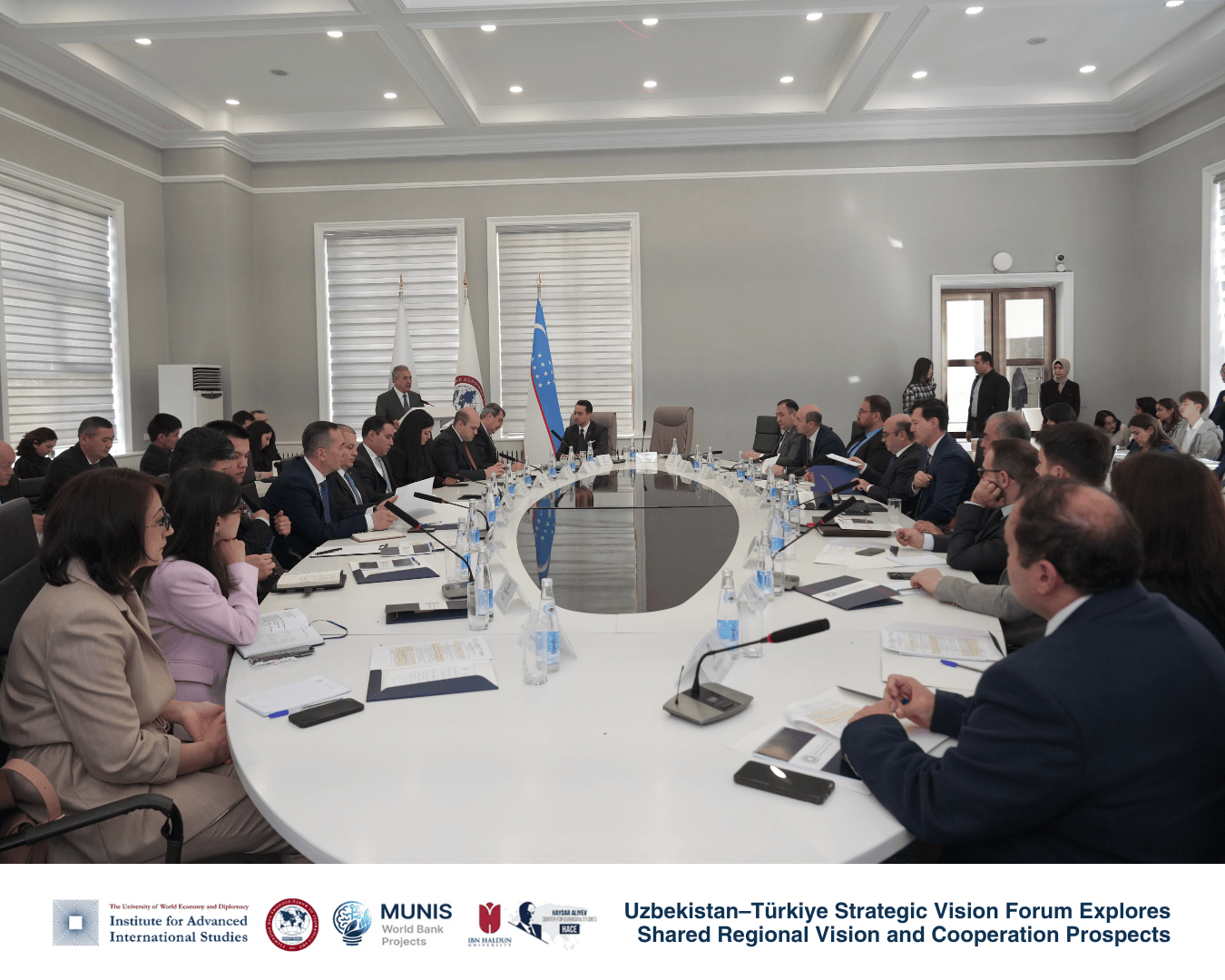
On October 13, the Institute for Advanced International Studies at the University of World Economy and Diplomacy hosted the Uzbekistan–Türkiye Strategic Vision Forum, co-organised with the Heydar Aliyev Center for Eurasian Studies at Ibn Haldun University (Istanbul, Türkiye) and supported by the World Bank’s MUNIS project PRIM grant. The Forum brought together diplomats, researchers, and academics from both countries to discuss new dimensions of bilateral cooperation, regional security, and the transformation of the Turkic world amid global shifts.
The opening session featured Prof. Sodyq Safoev, First Deputy Chairman of the Senate of the Oliy Majlis and Rector of UWED, Dr. Ufuk Ulutaş, Ambassador of Türkiye to Uzbekistan, Mirvokhid Azimov, Deputy Secretary General of the Organization of Turkic States, Prof. Atilla Arkan, President of Ibn Haldun University, and Prof. Mesut Özcan, President of the Diplomacy Academy of the Turkish MFA and Rector of Ankara Social Sciences University. In their welcoming remarks, the speakers emphasized the pivotal importance of educational diplomacy, strategic dialogue, and institutional synergy between Tashkent and Ankara as drivers of long-term partnership and shared prosperity within the Turkic community.
The first session, titled “Uzbekistan–Türkiye: New Horizons for Strategic Cooperation”, chaired by Odil Gafarov, Deputy Director of IAIS, included speeches from Mr. Javlon Vakhabov, Deputy Advisor to the President of Uzbekistan and Managing Director of the International Institute for Central Asia, Prof. Emran Akıllı from SETA and Hacı Bayram Veli University, Dr. Akram Umarov, First Vice-Rector of UWED and Director of IAIS, and Prof. Yaşar Sarı of Ibn Haldun University. Discussions underscored the strategic importance of political coordination in Central Asia’s shifting geopolitical environment and analysed Türkiye’s multi-vector diplomacy and its role in shaping Central Asia’s regional identity further explored how digital transformation, infrastructure development, and cultural diplomacy can elevate the Uzbek–Turkish partnership to a new strategic level.
The second session, “Security, Connectivity and Multilateral Relations among Members of the Organization of Turkic States”, chaired by Prof. Yaşar Sarı, examined how the OTS can serve as a collective platform for ensuring regional stability and expanding cross-border cooperation. Speakers, i.e. Dr. Bakhtiyor Mustafaev, Deputy Director of the Institute for Strategic and Regional Studies, Dr. Tolga Sakman, President of the Center for Diplomatic Affairs and Political Studies (DİPAM), Mr. Odil Gafarov, and Assoc. Prof. Ali Oğuz Diriöz, TOBB ETÜ University / ANKASAM, discussed security coordination mechanisms within the Turkic world and their alignment with broader Eurasian frameworks, highlighting Türkiye’s accumulated diplomatic experience within Europe as a model for strengthening institutional resilience in the Turkic world. Contributions underscored the need for structured dialogue formats and enhanced multilateral coordination through the OTS to sustain peace, connectivity, and inclusive growth across the region.
The third session, “Navigating a Fragmented Global Order”, was moderated by Prof. Ulugbek Khasanov of UWED. Assoc. Prof. Muhammet Koçak of the National Intelligence Academy and Ankara Social Sciences University, Mr. Mirshokhid Aslanov, Co-founder and CEO of the Center for Progressive Reforms, Assoc. Prof. Ulugbek Ishankhodjaev of IAIS, and Assoc. Prof. Ali Oğuz Diriöz focused on the challenges and opportunities faced by Türkiye and Uzbekistan amid shifting global alignments and the reconfiguration of international trade corridors and offered a comprehensive analysis of Türkiye’s adaptive foreign policy strategy in the context of increasing geopolitical fragmentation.
The Forum also hosted book presentations highlighting recent scholarly contributions to Turkic and Uzbek studies. Dr. Erkan Avcı of Tashkent State World Languages University presented his book “The Role of Islam in the Construction Process of Uzbek Identity”, exploring the spiritual and intellectual foundations of national consciousness. Dr. İsmail Polat, an independent researcher at the Türkiye National Security University, introduced “First President of Uzbekistan Islam Karimov: The Formation of National Ideology”, which examines the evolution of Uzbekistan’s political thought during the formative years of independence.
In their closing remarks, Dr. Akram Umarov and Prof. Yaşar Sarı expressed gratitude to all partners and participants, underlining that the Forum marks a milestone in institutionalizing strategic academic dialogue between Uzbekistan and Türkiye. The event reaffirmed a shared vision of cooperation within the Organization of Turkic States and the broader Eurasian region, a partnership built on mutual trust, cultural kinship, and the pursuit of a more connected and resilient future.